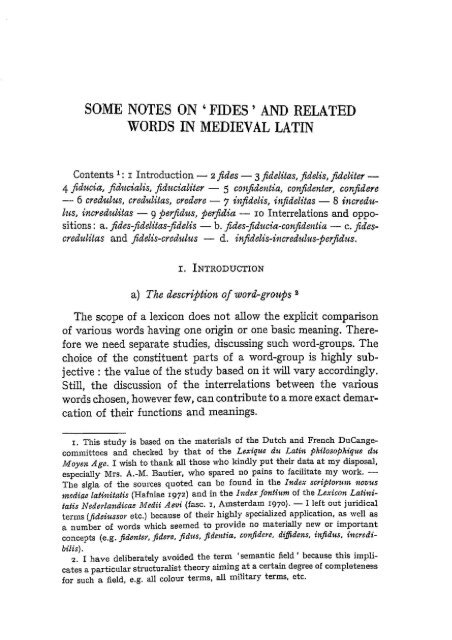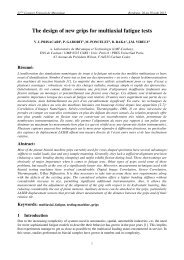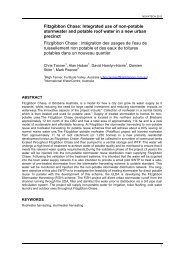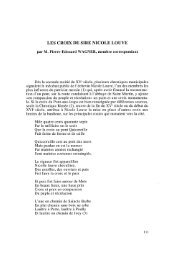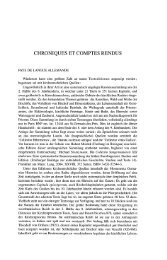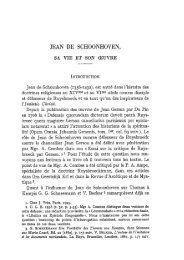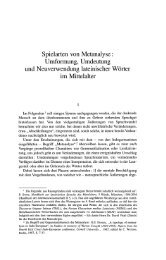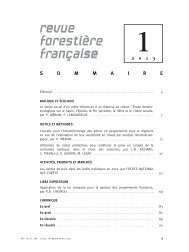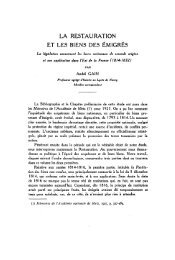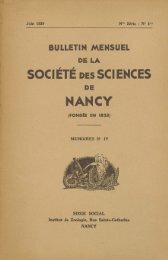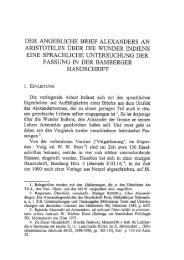fides ' and relate d words in medieval lati n
fides ' and relate d words in medieval lati n
fides ' and relate d words in medieval lati n
You also want an ePaper? Increase the reach of your titles
YUMPU automatically turns print PDFs into web optimized ePapers that Google loves.
SOME NOTES ON ` FIDES ' AND RELATE D<br />
WORDS IN MEDIEVAL LATI N<br />
Contents 1 : z Introduction — 2 <strong>fides</strong> — 3 fidelitas, fidelis, fideliter —<br />
4 fiducia, fiducialis, fiducialiter — 5 confidentia, confidenter, confider e<br />
— 6 credulus, credulitas, credere — 7 <strong>in</strong>fidelis, <strong>in</strong>fidelitas — 8 <strong>in</strong>credulus,<br />
<strong>in</strong>credulitas — 9 perfidus, perfidia — io Interre<strong>lati</strong>ons <strong>and</strong> oppositions<br />
: a . <strong>fides</strong>-fidelitas-fidelis — b . <strong>fides</strong>fiducia-confidentia — c. <strong>fides</strong>credulitas<br />
<strong>and</strong> fidelis-credulus — d . <strong>in</strong>fidelis-<strong>in</strong>credulus-perfidus .<br />
I . INTRODUCTION<br />
a) The description of word-groups a<br />
The scope of a lexicon does not allow the explicit comparison<br />
of various <strong>words</strong> hav<strong>in</strong>g one orig<strong>in</strong> or one basic mean<strong>in</strong>g . Therefore<br />
we need separate studies, discuss<strong>in</strong>g such word-groups . Th e<br />
choice of the constituent parts of a word-group is highly sub -<br />
j ective : the value of the study based on it will vary accord<strong>in</strong>gly .<br />
Still, the discussion of the <strong>in</strong>terre<strong>lati</strong>ons between the various<br />
<strong>words</strong> chosen, however few, can contribute to a more exact demarcation<br />
of their functions <strong>and</strong> mean<strong>in</strong>gs .<br />
1. This study is based on the materials of the Dutch <strong>and</strong> French DuCangecommittees<br />
<strong>and</strong> checked by that of the Lexique du Lat<strong>in</strong> philosophique du<br />
Moyen Age . I wish to thank all those who k<strong>in</strong>dly put their data at my disposal,<br />
especially Mrs, A .-M . Bautier, who spared no pa<strong>in</strong>s to facilitate my work . —<br />
The sigla of the sources quoted can be found <strong>in</strong> the Index scriptorum novus<br />
mediae lat<strong>in</strong>itatis (Hafniae 1972) <strong>and</strong> <strong>in</strong> the Index fontiur of the Lexicon Lat<strong>in</strong>itatis<br />
Nederl<strong>and</strong>icae Medii Aevi (fasc . 1, Amsterdam 1970). — I left out juridical<br />
terms (fideiussor etc .) because of their highly specialized application, as well a s<br />
a number of <strong>words</strong> which seemed to provide no materially new or important<br />
concepts (e .g . fidenter, fidere, <strong>fides</strong>, fidentia, confidere, diffidens, <strong>in</strong>fidus, <strong>in</strong>credibilis)<br />
.<br />
2. I have deliberately avoided the term 'semantic field' because this implicates<br />
a particular structuralist theory aim<strong>in</strong>g at a certa<strong>in</strong> degree of completenes s<br />
for such a field, e .g. all colour terms, all military terms, etc.
78<br />
b) `Fides ' as the center of a word-group<br />
The choice of <strong>fides</strong> as the center of the word-group to b e<br />
studied has been the result of the follow<strong>in</strong>g considerations . In<br />
late Antiquity 3 the word had been given a fresh impulse by<br />
becom<strong>in</strong>g the particular term for the Christian faith . This development<br />
was firmly established <strong>in</strong> the Christian Middle Ages ,<br />
where <strong>fides</strong> universally figures as the one term for the one universal<br />
faith (cf. ch. Io c) .<br />
Now this development may give rise to two hypotheses :<br />
I . The enormous expansion of <strong>fides</strong> <strong>in</strong> the mean<strong>in</strong>g of `Christian<br />
faith ' suggests a parallel extension of the range of uses to which<br />
the word may be applied, viz. its occurrence <strong>in</strong> comb<strong>in</strong>ation with<br />
verbs, adjectives etc . This idea is obvious <strong>and</strong> will easily be proved<br />
by the lemmata of the various Medieval-Lat<strong>in</strong> lexica .<br />
2 . The same universal extension of the mentioned authorized us e<br />
of <strong>fides</strong> mean<strong>in</strong>g `Christian faith ' may suggest another theory :<br />
it may have caused the gradual decl<strong>in</strong>e of the other mean<strong>in</strong>gs o f<br />
the word. At a time when <strong>fides</strong> was primarily associated wit h<br />
Christian faith, the word probably grew less apt to designat e<br />
quite different concepts .<br />
The second hypothesis cannot be verified quantitatively, s<strong>in</strong>c e<br />
no lexicon of Medieval Lat<strong>in</strong> counts word-frequency under it s<br />
aims, <strong>and</strong> with good reason . No conclusion can be drawn from<br />
the number of cards, <strong>and</strong>, accord<strong>in</strong>gly, an empirical verificatio n<br />
<strong>in</strong> the quantitative sense seems to be a possibility excluded .<br />
Still, it might be said that the hypothesis is a priori probable ' .<br />
There is, however, a different way to check the same hypothesis<br />
empirically, viz . by show<strong>in</strong>g how the non-Christian functions<br />
of <strong>fides</strong> gradually tended to be performed by other <strong>words</strong> .<br />
An example is provided by the word fidelitas, tak<strong>in</strong>g the specific<br />
function of feudal allegiance. For discussion of this development ,<br />
see ch . Io a .<br />
3. By Antiquity I mean the period up to ca . AD 500, <strong>in</strong>clud<strong>in</strong>g Christian<br />
Antiquity .<br />
¢. Cf. e .g. the Dutch ' geweer ', which orig<strong>in</strong>ally meant 'defence', but<br />
came to mean 'gun' pr<strong>in</strong>cipally, to the effect that the first sense was taken<br />
over by 'afweer' .
2 . FIDE S<br />
Our <strong>medieval</strong> sources do not provide fully new mean<strong>in</strong>gs of<br />
<strong>fides</strong>, though there has been a shift <strong>in</strong> stress between two classical<br />
mean<strong>in</strong>gs (see ch . Io a) <strong>and</strong> a number of new expressions<br />
have been created . Accord<strong>in</strong>gly, we can use Fraenkel's Thesaurus<br />
article 6 for our basis, ever though He<strong>in</strong>ze's criticism 6 is not<br />
unfounded . He<strong>in</strong>ze argues that <strong>fides</strong> <strong>in</strong>dicates a re<strong>lati</strong>on with two<br />
directions : denot<strong>in</strong>g the reliability of a person or th<strong>in</strong>g, it implie s<br />
at the same time the trust which the opposite party puts <strong>in</strong> i t<br />
(cf. SUMMA Trec . p. 84, Io <strong>fides</strong> autem est que ab uno promittitur<br />
et ab altero ita fieri speratur) . The truth of this argument is experienced<br />
by anyone who tries to divide his quotations <strong>in</strong>to tw o<br />
dist<strong>in</strong>ct groups : reliability <strong>and</strong> trust . Still, <strong>in</strong> writ<strong>in</strong>g a lemma<br />
for a lexicon, as Fraenkel did, it is necessary to make such<br />
dist<strong>in</strong>ctions. The follow<strong>in</strong>g scheme is based on his article .<br />
Survey of mean<strong>in</strong>gs<br />
I. someth<strong>in</strong>g which is trusted or relied upo n<br />
A the th<strong>in</strong>g itself which is trusted (guarantee, oath, confirmation<br />
)<br />
B the quality of people (<strong>and</strong> their deeds <strong>and</strong> <strong>words</strong>) <strong>in</strong> virtu e<br />
of which trust is put <strong>in</strong> them (reliability, trustworth<strong>in</strong>ess ,<br />
fidelity )<br />
II. trust or faith<br />
A <strong>in</strong> general<br />
B <strong>in</strong> a philosophic-theological sense<br />
a logical<br />
b metaphysical-theological<br />
C <strong>in</strong> the specifically Christian sens e<br />
5. Thesaurus L<strong>in</strong>guae Lat<strong>in</strong>ae VI, 1 col . 661-691 .<br />
6. R. HEINzE, Fides <strong>in</strong> Hermes 64 ( 1 933) p. 14o-66.<br />
7 9
8 0<br />
Detail s<br />
(Ad IA) The expression 'fidem facere ' is regarded by Fraenkel 7<br />
as a very particular case, as the orig<strong>in</strong>, <strong>in</strong> fact, of the mean<strong>in</strong>g<br />
'belief ', 'faith ' . It is found <strong>in</strong> ancient rhetoric (cf. e.g . Rhet . ad<br />
Herennium I 6, 10 si oratio adversariorum fecerit fidem auditoribus)<br />
. In such contexts the expression means 'to establish faith<br />
among the public ' . Whatever the value of Fraenkel's theor y<br />
that this is the orig<strong>in</strong>, <strong>and</strong> of He<strong>in</strong>ze's op<strong>in</strong>ion of it 8, for Medieva l<br />
Lat<strong>in</strong> the question is not very complicated : fidem facere nearly<br />
always means 'to take an oath ', 'to guarantee ', e.g. CHART .<br />
Trai . Brom 24, 1 p . 3 04, 7 [1424] dantes eidem m<strong>and</strong>atum . . .<br />
ord<strong>in</strong><strong>and</strong>i, consenciendi et, si necesse fuerit, fidem faciendi . Compare<br />
also the expressions for 'to guarantee (to swear fidelity) by means<br />
of an oath ' : EINH. Carol. (ed. Halphen) p . 20 sacramento fidem<br />
facere ; GREG. IV epist. p. 230, 14 memorem me esse debere iurisiur<strong>and</strong>i<br />
causa fidei facti imperatori ; RADBERT. epitaph. arsen .<br />
AASS Ben. IV, 1 p. 512 mementote . . . quod mei vassali estis mihique<br />
cum iuramento fidem frmastis . There are, however, a few exceptions,<br />
<strong>in</strong> which the classical rhetorical mean<strong>in</strong>g 'to establis h<br />
faith ' survives : it occurs, for <strong>in</strong>stance, <strong>in</strong> <strong>medieval</strong> logic, wher e<br />
Cicero's def<strong>in</strong>ition of argumentum, borrowed by Boethius, is<br />
reproduced by many others throughout the Middle Ages (cf .<br />
below pp . 81-2) . Compare also the expression 'fidem creditivam<br />
facere quod ' (' to make plausible ', 'to prove ') : CHART. Bred a<br />
358, 17 p . 54, 8 [1420] dum no bis fidem fecerit creditivam quod<br />
cont<strong>in</strong>ue residerit <strong>in</strong> studio generali . The concept of 'to establish<br />
faith ' is sometimes expressed by <strong>fides</strong> . comb<strong>in</strong>ed with a differen t<br />
verb : RAYM. POD . 8 p . 249 durisque his atque aliis ostentamentis<br />
fidem magnifice victorie nobis persuasissent.<br />
(Ad IB) For 'conjugal fidelity ' the usual word seems to b e<br />
<strong>fides</strong> (<strong>and</strong> not fidelitas), cf. e.g. PHIL. LEYD . cur. 84,8 Bona vero<br />
matrimonii pr<strong>in</strong>cipaliter tria sent : <strong>fides</strong>, proles et sacramentum . In<br />
fide attenditur ne post v<strong>in</strong>culum coniugale cum alio vel alia coeatur.<br />
Accord<strong>in</strong>gly, the expression for wedd<strong>in</strong>g-r<strong>in</strong>g is anulus fidei .<br />
7. E . FRAENKEL, .Zur Geschichte des Wortes <strong>fides</strong>, <strong>in</strong> Rhe<strong>in</strong> . Mus . 191 6<br />
p . 18 7-99 .<br />
8. See note 6 .
(Ad IB) A special case of 'reliability' is provided by th e<br />
expression ' fidei alicuius (or alicuius rei) committere ' ('to entrust<br />
to ') which constitutes a metaphorical development of the ancien t<br />
juridical use. Cf. e.g. CHRON. s. Michael. Mos. p. t4 et cuisisfidei<br />
possent committi que suet tacenda ; CARTUL. s. Petri Trec. 1 8<br />
p . 27 dignum est . . . transactiones et pasta . . . fidei committere litterarum<br />
.<br />
(Ad IIA) The mean<strong>in</strong>g ' faith 'belief ' <strong>in</strong> the general, non-<br />
Christian sense seems to occur <strong>in</strong> a number of more or less fixe d<br />
expressions : fidem habere, fidem adhibere, fidem dare, fide dignus .<br />
As far as fidem habere is concerned, Fraenkel assumes ° that i n<br />
orig<strong>in</strong> this expression did not mean ' fiduciam ha bere erga aliquem ' ,<br />
but 'alicui fidelitatem attribuere' . In subsequent times, however ,<br />
as Fraenkel says himself 10 , this dist<strong>in</strong>ction was not experience d<br />
any more <strong>and</strong> often adhibere was used <strong>in</strong>stead of habere . In our<br />
Medieval texts the notion of 'reliability' has disappeared from<br />
this expression <strong>and</strong> the only mean<strong>in</strong>g which can be attributed to<br />
it is ' to give credence to ', ' to put faith <strong>in</strong> ' . This agrees with th e<br />
fact that most quotations have a Christian context, which ofte n<br />
makes it hardly possible to determ<strong>in</strong>e whether the mean<strong>in</strong>g i s<br />
general (non-Christian) or rather religious . Cf. e.g . BUSCH<br />
ref. 3,1 p. 675,22 Si quis . . . farmam fidem a deo se exaudiri habuerit .<br />
A quite different mean<strong>in</strong>g of fidem habere is found <strong>in</strong> RICHER .<br />
hist . 4,59 p . 244,16 libellumfdelitatis ab Arnulfo quondam regibu s<br />
de habenda fide porrectum, where it is equivalent to fidem tenere<br />
or conservare . The expression fidem dare can also mean 't o<br />
promise ', at least <strong>in</strong> the phrase dextram et fidem dare (GESTA<br />
Franc. Hierosol . 15 p. 76 ; PETR. TUDEB . hist . 6,4 p. 40 . )<br />
(Ad IIB) Def<strong>in</strong>itions of <strong>fides</strong> are found <strong>in</strong> logic as well as i n<br />
metaphysics. The source of its appearance <strong>in</strong> logic is the def<strong>in</strong>itio n<br />
of argumentum as given by Cicero <strong>in</strong> his Topica <strong>and</strong> adopted by<br />
Boethius 11 : argumentum est ratio rei dubiae faciens fidem . This<br />
has been reproduced by countless philosophers <strong>in</strong> the course o f<br />
the centuries. The late 15th century Dutch philosopher Gerar d<br />
g. Cf. Thes. L.L . s .v. <strong>fides</strong> cap. primum I B, col . 68 5, 4 2 -47 .<br />
io . ibid. col. 686,4o <strong>and</strong> cf . col. 686,x6-17 .<br />
Il . Cf. Cic . Top . 8 ; Boeth . In Cic . Top . 1, 1o48B7-8 <strong>and</strong> De top . diff. is94C7- 8<br />
<strong>and</strong> 118oC 4-5 .<br />
8 1
82<br />
of Harderwij k puts fidem facere, as conta<strong>in</strong>ed <strong>in</strong> this def<strong>in</strong>ition ,<br />
on a level with pro bare : argumentum est ratio rei dubie facien s<br />
fidem, id est medium probans conclusionem 12 . It is clear, however,<br />
that the knowledge result<strong>in</strong>g from the probatio is knowledge of<br />
probability (syllogismus dialeticus est qui ex probabilibus facit<br />
credere ; <strong>fides</strong> . . . effectus est syllogisms probabilis 12 ), or, better, positive<br />
knowledge <strong>in</strong> cont<strong>in</strong>gent matters . The metaphysical-theological<br />
def<strong>in</strong>ition (<strong>fides</strong> est substantia rerum sper<strong>and</strong>arum, argumentum<br />
non apparentium, Vulg. Hebr . 11,1) implies the old concep t<br />
that we cannot have knowledge about th<strong>in</strong>gs which escape our perceptive<br />
faculties, but that we have to approach truth <strong>in</strong> thes e<br />
matters by means of an act of assent . The metaphysical description<br />
is used by Thierry of Chartres 14 to expla<strong>in</strong> one of the two<br />
k<strong>in</strong>ds of faith which he dist<strong>in</strong>guishes, viz . <strong>fides</strong> virtus as opposed<br />
to <strong>fides</strong> credulitas . For this dist<strong>in</strong>ction, which corresponds to the<br />
two k<strong>in</strong>ds of def<strong>in</strong>itions as discussed here, see ch . to c. The difference<br />
between the philosophic <strong>and</strong> theological sides of <strong>fides</strong> i s<br />
noticed by Albertus Magnus <strong>in</strong> his Summa theologica (Ia t. 3 q .<br />
15 C . z) : Aliter accipitur <strong>fides</strong> et credulitas <strong>in</strong> philosophicis et <strong>in</strong><br />
theologicis . In philosophicis enim, ut dicit Aristotiles <strong>in</strong> III D e<br />
Anima, op<strong>in</strong>io iuvata rationibus fit <strong>fides</strong> . . ., <strong>in</strong> theologicis autem fide s<br />
lumen est, certissimam faciens adhesionem et assensum .<br />
(Ad IIC) The division `Christian faith' should be subdivide d<br />
<strong>in</strong>to two, more or less dist<strong>in</strong>ct, aspects : actual faith (vríoi-s) on<br />
the one h<strong>and</strong> <strong>and</strong> the expression of it on the other, viz ., <strong>in</strong> it s<br />
most general form, the collection of the articles of faith, dogmatics .<br />
Of course, these two mean<strong>in</strong>gs are narrowly <strong>in</strong>ter<strong>relate</strong>d. An<br />
expression like <strong>fides</strong> Christi should now be <strong>in</strong>terpreted as `th e<br />
belief <strong>in</strong> Christ' (e .g. WILLIB . Bonif . 2,8, (II) <strong>in</strong> fide et dilection e<br />
Jesu Christi), now as 'the doctr<strong>in</strong>e, the church of Christ' a s<br />
opposed to paganism (e .g. VITA Liudg . 2,1, I p. 54,14 a paganism o<br />
revocans Christi imbuit fide ; CHRON. Tiel . p. 12,15 predicare<br />
fidem Christi et evangelium) . In early Christian times the first<br />
12. GER. HARDERW. summ . 5 p . 263A45 sqq .<br />
13. Id. ibid. p. 264 A 39 sqq . ; id. an. p. 152 R 28 (cf, Albertus Magnus, De<br />
anima p . 174,23) .<br />
14. Lect. Boet. Tr<strong>in</strong>. prol. 2 p . 125 .
mean<strong>in</strong>g (actual belief) was far more frequent 18 . Follow<strong>in</strong>g th e<br />
historical development of Christianity, however, the stress natur -<br />
ally has been transferred to the second . This varies from th e<br />
whole Christian faith (as opposed to paganism) to a particula r<br />
expression of it, symbolism fidei (e.g . GESTA abb . Fontan. p. 38<br />
<strong>fides</strong> Niceni concilii) .<br />
3 . FIDELITAS, FIDELIS, FIDELITE R<br />
a) Fidelitas<br />
For the hypothesis concern<strong>in</strong>g the specific function of this wor d<br />
<strong>in</strong> the feudal system <strong>and</strong> the re<strong>lati</strong>on between its mean<strong>in</strong>g s<br />
`fidelity' <strong>and</strong> `faith', see lb <strong>and</strong> zoa .<br />
The discussion of fidelitas as found <strong>in</strong> the Thesaurus 16, is<br />
quite disappo<strong>in</strong>t<strong>in</strong>g. It opens with the mislead<strong>in</strong>g statemen t<br />
`i.q . <strong>fides</strong> ' . Besides, its method differs from that of the <strong>fides</strong>article<br />
(which first dist<strong>in</strong>guishes `reliability' <strong>and</strong> `faith', subdivid<strong>in</strong>g<br />
the former <strong>in</strong>to reliability of persons <strong>and</strong> of th<strong>in</strong>gs) i n<br />
putt<strong>in</strong>g these three groups on the same level . This is both <strong>in</strong>correc t<br />
<strong>and</strong> <strong>in</strong>consistent 17 .<br />
Survey of mean<strong>in</strong>gs<br />
I : reliability, fidelity<br />
z fidelity, loyalty, feudal allegiance<br />
2 the oath of allegiance<br />
3 concrete : followers, the faithfu l<br />
4 pledge, security<br />
II : Christian faith<br />
Details<br />
It is extremely difficult to dist<strong>in</strong>guish sharply between I, z<br />
<strong>and</strong> I,2 . Cf. e.g. CHART. Trai . 574 p . 4 1,5 [1206] ut . . . hom<strong>in</strong>ium<br />
15. Cf. BLAISE, Dictionnaire Lat<strong>in</strong>-Franpais des auteurs Chrétiens, Paris rg94 ,<br />
s.v . <strong>fides</strong> 3 <strong>and</strong> 4 .<br />
16. Thes. L. L . VI, r col . 661 .<br />
17. The lemmata fcdelis, fidelitas, fideliter are not written by Fraenkel, but<br />
by G. Jachmann . The drawback of this work<strong>in</strong>g method is evident .<br />
83
8 4<br />
faciant et fidelitatem, et dom<strong>in</strong>us . . . omnes hom<strong>in</strong>es eos a fidelitat e<br />
quam ei fecerant et hom<strong>in</strong>io liberos et absolutos clamabit ;<br />
BERCHEN chron . Gelr. 12 p . 9,27 imperator a Lothario filia suo<br />
sacramento fidelitatem exegit . In few quotations the mean<strong>in</strong>g<br />
`oath ' cannot be doubted : SINN, expos . fo . 187 VB 18 et postea<br />
prestari debet fidelitas, id est iuramentum quod a vasallo prestatur<br />
dom<strong>in</strong>o .<br />
(Ad I,4) The mean<strong>in</strong>g 'pledge ' is new, cf. RAYM. POD. 1 3<br />
p. 265 suscepit dux obsides de castello pro fidelitate .<br />
(Ad II) Probably the rare examples of fidelitas <strong>in</strong> the mean<strong>in</strong> g<br />
of 'Christian faith ' are due to the double function of the adjectiv e<br />
fidelis (cf. ch. 3 b <strong>and</strong> xo a) .<br />
b) Fidelis<br />
This word is apt to denote the Christian believer as well as the<br />
vassal, <strong>in</strong> particular when used as a noun . Concern<strong>in</strong>g the conjecture<br />
of a k<strong>in</strong>d of distribution of tasks between <strong>fides</strong> <strong>and</strong> fidelitas<br />
(cf. ch . i b <strong>and</strong> io a), it may seem strange that the word<br />
fidelis should cover both fields. That this is, however, only the<br />
result of a natural development, will be shown <strong>in</strong> ch . zo a .<br />
In opposition to the historical sketch as given below (ch . xo a) ,<br />
the lexicographic scheme might be presented as follows :<br />
I adjective x faithful, loyal<br />
2 faithful, religious<br />
II noun x faithful follower : liegeman, vassa l<br />
2 faithful follower of Christ, Christian<br />
c) Fideliter<br />
The mean<strong>in</strong>gs of fideliter run parallel to the pr<strong>in</strong>cipal mean<strong>in</strong>gs<br />
of fidelis : it means '<strong>in</strong> a reliable way ' as well as 'accord<strong>in</strong>g t o<br />
faith ' . It has one side, however, which is not represented by<br />
fidelis, viz . 'confidently ', the non-Christian counterpart of th e<br />
Christian 'accord<strong>in</strong>g to faith ' (usually expressed by fiducialiter<br />
or confidenter) . Here the word seems to agree with the classica l<br />
mean<strong>in</strong>g of <strong>fides</strong> : 'confidence ', 'trust ' ( <strong>fides</strong> IIA) .
Survey<br />
1 truly, loyally<br />
2 a) confidently<br />
b) accord<strong>in</strong>g to faith<br />
Details<br />
For a peculiarity with<strong>in</strong> the first mean<strong>in</strong>g, cf. ANSELM . LEOD .<br />
opuse . I p. 462,34 Dicit enim August<strong>in</strong>us : Quicumque sic credit<br />
ut loquitur, etsi vera non loquatur, tarnen fideliter loquitur.<br />
4 . FIDUCIA, FIDUCIALIS, FIDUCIALITER<br />
a) Fiduci a<br />
On the one h<strong>and</strong> this word has preserved its classic mean<strong>in</strong>g o f<br />
' confidence', ' trust ', whereas it is certa<strong>in</strong>ly not conf<strong>in</strong>ed to the non -<br />
Christian side of this concept . On the contrary, it is often used to de -<br />
note the confidence <strong>in</strong> God (ad Deurn, <strong>in</strong> Deo, <strong>in</strong>Deum) . Its mean<strong>in</strong> g<br />
may slightly differ from <strong>fides</strong>, <strong>in</strong> this respect, for which see ch. rob .<br />
On the other h<strong>and</strong> fiducia is used <strong>in</strong> the sense of <strong>fides</strong> or fidelitas,<br />
mean<strong>in</strong>g ' oath of fidelity or of allegiance ', <strong>in</strong> various<br />
expressions : fiduciam (-as) acciiere, dare, facere . Cf. e.g. CARTUL .<br />
s . Magd . Castrodun . 23 p . z8 [1153] serviens vero et grangie<br />
tritores michi fiduciam vel iusiur<strong>and</strong>urn facient ; CARTUL . Glannafol.<br />
66 p . 410 [1125-29] illi hom<strong>in</strong>es facient fiduciam ; CARTUL .<br />
Maleolon . lo p . 15 si <strong>in</strong>fra term<strong>in</strong>os redierit, ubi fiducias de censu<br />
term<strong>in</strong>is convenientibus dare voluerit, terra<strong>in</strong> habebit ; CARTUL .<br />
s . Joh . <strong>in</strong> Vail. 33 p. 19 [1123] a cliente nostro fiduciam acciieret .<br />
This mean<strong>in</strong>g is unprecedented <strong>in</strong> earlier times <strong>and</strong> should possibly<br />
be ascribed to the <strong>in</strong>fluence of <strong>fides</strong>, which orig<strong>in</strong>ally denoted<br />
a re<strong>lati</strong>on with two directions (trustworth<strong>in</strong>ess <strong>and</strong> trust, cf . ch. z ,<br />
IA <strong>and</strong> B) <strong>and</strong> always preserved these two aspects simultaneously.<br />
Accord<strong>in</strong>gly, on the analogy of <strong>fides</strong> mean<strong>in</strong>g 'oath' or<br />
' fidelity ' at the same time as ' trust ' or ' faith ', fiducia may have<br />
been given the new mean<strong>in</strong>g ' oath ', 'fidelity ' . A similar case is<br />
provided by the <strong>words</strong> credulus <strong>and</strong> credulitas (see ch. 6a <strong>and</strong> b) 18 .<br />
18 . I do not th<strong>in</strong>k that the few examples of fidelitas <strong>in</strong> the mean<strong>in</strong>g of<br />
'Christian faith' can be ascribed to the same phenomenon (cf . ch. 3b) .<br />
8 5
8 6<br />
Survey<br />
I trust, faith<br />
z a) (oath of) fidelity, allegianc e<br />
b) surety, guarantee<br />
c) protection<br />
Details<br />
A particular (rare) case of the ' passive ' mean<strong>in</strong>g (2) is `surety ' ,<br />
e.g . CARTUL. s . Mar. s. Anton . XVI p . 26 [Io47-61] Albu<strong>in</strong>u s<br />
abbatisse . . . quoddam iugerum venundavit v<strong>in</strong>ee ; estque Joscelïnu s<br />
de Melez fidutia pro supradicto Albu<strong>in</strong>o .<br />
Another remarkable aspect is the mean<strong>in</strong>g of 'protection ', fo r<br />
which <strong>in</strong> classical Lat<strong>in</strong> <strong>fides</strong> would have been used : ANNAL .<br />
Mett . I p. 32 cerneras autem Gripo quad m<strong>in</strong>ime potuisset evadere,<br />
<strong>in</strong> fiduciam fratrum suorum venit .<br />
In accordance with the 'passive ' mean<strong>in</strong>g, the verb fiduciar e<br />
is used to denote 'to promise', 'to swear' ; HIST . Ludov . 7,24<br />
p. 175 ei fiduciavit quod communie de<strong>in</strong>ceps non consentiret se d<br />
earn, pentus dissiparet ; CARTUL. s . Cyr . Nivern . Ill p. 18 7<br />
[1173] qualitercumque . . . et de quocumque voluer<strong>in</strong>t firmare et firmitatem<br />
garentizare, pepigi et fiduciavi ; LAMB . ARD . hist .<br />
Ghisn. 66 p . 593,37 earn t<strong>and</strong>em <strong>in</strong> uxorem sibi fiduciavit e t<br />
spopondit .<br />
b) Fiducialis<br />
This adjective does not call for any specific remarks .<br />
c) Fiducialiter<br />
Here aga<strong>in</strong> the Thesaurus-article 19 seems <strong>in</strong>sufficient : fiducialiter<br />
is translated with licenter, confidenter, fideliter. Thes e<br />
three terms refer to two different concepts : licenter <strong>and</strong> confidenter<br />
mean 'self-confidently', `frankly', whereas fideliter, as<br />
appears from the quotations, must mean here 'full of confidence ,<br />
trust '. Quotations, illustrat<strong>in</strong>g the two mean<strong>in</strong>gs, are given<br />
<strong>in</strong>termixedly, <strong>in</strong>deed .<br />
19 . Thes . L . L . VI,x col. 702, 7-68 .
In the Medieval texts the mean<strong>in</strong>g `full of trust' is predom<strong>in</strong>an t<br />
<strong>and</strong>, as fiducia, is often applied to Christian contexts .<br />
Survey<br />
z full of trust<br />
2 self-confidently, frankly<br />
3 safely<br />
Details<br />
The third mean<strong>in</strong>g, `safely', which already occurs <strong>in</strong> early<br />
Christian times, seems to agree with the `passive' side of fiducia<br />
(see 4a) . E. g . GESTA Franc. Hierosol. 3 p. 16 cum putaren t<br />
exire fiducialiter quo vellent .<br />
5 . CONFIDENTIA, CONFIDENTER, CONFIDER E<br />
a) Confadentia<br />
As fiducia, confidentia has reta<strong>in</strong>ed its mean<strong>in</strong>g `confidence ' ,<br />
`trust', which is applied without restrictions to the trust <strong>in</strong> Go d<br />
(ad Deum, <strong>in</strong> Deum, <strong>in</strong> Deo) . It also reta<strong>in</strong>ed its classic mean<strong>in</strong>g<br />
`self-confidence ' or `audacity ' .<br />
b) Confidenter<br />
Firstly, the word preserved the classic mean<strong>in</strong>g of ` confidently' ,<br />
`with assurance ', `audaciously ' .<br />
Secondly, it serves as the adverb express<strong>in</strong>g the mean<strong>in</strong>g o f<br />
` to trust', which is also expressed by confidentia <strong>and</strong> confidere .<br />
E. g . GROTE paup. p. 436,5 div<strong>in</strong>e voluntati . . . peticiones eorum<br />
humiles confidenter committentes .<br />
Thirdly, it sometimes seems to mean ' so as to establis h<br />
confidence ' : ACTA Henr. II 488 t. II p. 39 promisit autem confidenter<br />
quod de eodem daturus est mihi fideiussores . Compare the<br />
third mean<strong>in</strong>g of fiducialiter, which, however, is not wholly<br />
similar : fiducialiter means ` <strong>in</strong> a way which gives rise to on e<br />
own's confidence', whereas confidenter means 'so as to provok e<br />
an other person's confidence ' .<br />
87
88<br />
c) Confider e<br />
In accordance with confidentia, the verb confidere (mean<strong>in</strong> g<br />
'to put confidence <strong>in</strong> ') is applied to the Christian atmosphere .<br />
It is also found as 'to entrust to ' (= credere, committere) : VITA<br />
Joh . Br<strong>in</strong>ck . fo . 33 V p . 337,5 venit aliqu<strong>and</strong>o fem<strong>in</strong>a quedam a d<br />
eum confidens ei bursam plenam pecuniis .<br />
6 . CREDULITAS, CREDULUS, CREDERE<br />
a) Credulitas<br />
On the one h<strong>and</strong> credulitas preserved both its older mean<strong>in</strong>g<br />
'credulity ' <strong>and</strong> the more recent mean<strong>in</strong>g 'faith ', 'persuasion '<br />
(<strong>in</strong> the general as well as the Christian sense) . On the other han d<br />
the word occurs <strong>in</strong> the 'passive ' mean<strong>in</strong>g, viz . ' trustworth<strong>in</strong>ess ' ,<br />
'credibility '. Cf . ACTA duc . Norm. 115 p. 278 [1048] data <strong>in</strong>super<br />
credulitatis gratia mea fide; LAMB. MONT . phys . 4 fa 77VB5 ad<br />
credulitatem huius op<strong>in</strong>ions multum proficit quod . . .<br />
Survey :<br />
= credulity<br />
2 faith, persuasion (general <strong>and</strong> Christian )<br />
3 a) trustworth<strong>in</strong>ess, credibilit y<br />
b) protection (= <strong>fides</strong>)<br />
c) credit (= credentia )<br />
Details<br />
As the extension which fiducia underwent on account of th e<br />
new 'passive ' mean<strong>in</strong>g shows ample differentiation, so th e<br />
'passive ' side of credulitas is not conf<strong>in</strong>ed to the more general<br />
mean<strong>in</strong>g of 'reliability' . As fiducia, it seems to have been used<br />
to denote 'protection ' : CARTUL. Rusc<strong>in</strong>on . priv. p. 48 de toto<br />
hoc predicto acciplo illos <strong>in</strong> meam credulitatem et ero Xis . ., manutenens<br />
et adiutor (<strong>in</strong> classical Lat<strong>in</strong> accipere <strong>in</strong> fidem) .<br />
Secondly, credulitas seems to occur <strong>in</strong> the sense of credentia,<br />
'credit ' : CARTUL . Antr. 17 p. 147 vendas scilicet que de macellariorum<br />
officio exeunt et ab eisdem macellariis credulitatem <strong>in</strong><br />
carne emenda per quadrag<strong>in</strong>ta dies. Compare credere I, 1 .
) Credulus<br />
The word runs parallel to the noun. The old mean<strong>in</strong>g 'credulous<br />
' survived. The commonest <strong>medieval</strong> mean<strong>in</strong>g is `hav<strong>in</strong> g<br />
faith ', which mostly st<strong>and</strong>s without a complement, but some -<br />
times takes a dative case : `hav<strong>in</strong>g faith <strong>in</strong> ', 'believ<strong>in</strong>g ', e .g .<br />
HUGO Lid. 7 p. 285B25 ego dem<strong>and</strong>o sibi, quatenus de cetero credulus<br />
sit dons omnipotentis filii dei . In this sense credulus is also<br />
used as a noun denot<strong>in</strong>g the faithful Christian .<br />
On the other h<strong>and</strong>, still agree<strong>in</strong>g with credulitas, the word<br />
occurs <strong>in</strong> the passive sense of 'trustworthy', 'reliable', cf . e.g .<br />
ERMOLD. NIGEL. Ludow. 348 (MGH Poet . II p. 16) jbortarum<br />
custos credulus atque sagax . Probably, the unexpected appearance<br />
of a passive side, both of credulus <strong>and</strong> of credulitas, may be com-<br />
pared to the similar phenomenon as found for fiducia (see ch. 4a)<br />
<strong>and</strong> may be expla<strong>in</strong>ed <strong>in</strong> the same way 20 .<br />
Survey :<br />
z credulous<br />
2 hav<strong>in</strong>g faith (general <strong>and</strong> Christian )<br />
3 trustworthy, reliable .<br />
c) Credere<br />
Just as <strong>fides</strong> was the particular term to denote Christian faith ,<br />
so credere was the verb express<strong>in</strong>g the action of believ<strong>in</strong>g, i.e .<br />
adher<strong>in</strong>g to Christian dogma. Be<strong>in</strong>g a technical term, the word<br />
was enriched (as <strong>fides</strong> was) by a number of technical expressions ,<br />
e.g . credere Deo, credere Deum <strong>and</strong> credere <strong>in</strong> Deum, all three<br />
express<strong>in</strong>g a different k<strong>in</strong>d of faith 21 .<br />
In contrast to the development of <strong>fides</strong> (cf. ch. lb <strong>and</strong> Ica) ,<br />
there seems to be no reason to suppose that credere lost any of<br />
its orig<strong>in</strong>al functions . Firstly, the verb shows the entire range o f<br />
classic mean<strong>in</strong>gs, augmented with some new expressions base d<br />
on them. Secondly, there is no other verb which has taken ove r<br />
one or other specific function .<br />
zo. Under credulus the Thes. L. L. (IV I151-53) mentions two places which<br />
are described as 'passive, i . quod facile creditur' .<br />
2I . Cf. e .g. H. A. OBERMAN, The Harvest of Medieval Theology, Harvard Un .<br />
Press 1963 p . 464-65 .<br />
89
9 0<br />
Survey<br />
I generally<br />
z to entrust to, to give credit<br />
2 to believe, to attach faith t o<br />
3 to believe, to th<strong>in</strong>k<br />
II of Christian faith : to have faith, to believe<br />
Details<br />
The general mean<strong>in</strong>g of 'to believe ', 'to attach faith to '<br />
(I,2) provides a number of new expressions, e .g . leviter credens ,<br />
'credulous ' (cf . German ' leichtgläubig '), cf. HENR. ARNHEM .<br />
ort. 10,74 erat enim homo simplex, leviter credens (cf. GUILL. TYR .<br />
hist . res. transm . XIII, 11 p. 570 qui simplex et nimium credulus<br />
verbis illius fidem habens) .<br />
A particular expression resort<strong>in</strong>g under II is credentes, which<br />
is synonymous to creduti (cf. ch. 1oc) .<br />
The expression of ' credere ad ', as found <strong>in</strong> the Thesaurus<br />
is probably due to a mis<strong>in</strong>terpretation of a number of passages ,<br />
which are all founded on one sentence occurr<strong>in</strong>g <strong>in</strong> the Vulgata :<br />
Gen. 15,6 Eduxit eum foras et ait illi : suspice caelum et numera<br />
stellas si potes . Et dixit ei : sic erit semen tuum. Credidit Abram<br />
Deo et reputatum est ilii ad iustitiam (' he counted it to him for<br />
righteousness ') . This may be the source of Ambrosius, Paul<strong>in</strong>u s<br />
of Nola <strong>and</strong> August<strong>in</strong>us as quoted <strong>in</strong> the Thesaurus, though it is<br />
remarkable that <strong>in</strong> all three quotations credere is comb<strong>in</strong>ed with<br />
corde . The expressions of ' fadem habere ad ' <strong>and</strong> 'fiducia ad Deum ' ,<br />
though seem<strong>in</strong>g to provide parallels, provide no sufficient reason<br />
to accept the alleged 'credere ad', which <strong>in</strong> all three cases is<br />
followed by iustitiam ! The quotations from Hieronymus (vir . ill .<br />
5 cum ad praedicationem eius Sergius credidisset) <strong>and</strong> c. Vigil . 6<br />
(ad suum evangelium crediderunt), given <strong>in</strong> the same passage of<br />
the Thesaurus, are out of place, because they illustrate a quit e<br />
different mean<strong>in</strong>g of ad, viz. 'after hear<strong>in</strong>g. . . ', 'follow<strong>in</strong>g . . . ' ,<br />
which already occurs <strong>in</strong> Antiquity. F<strong>in</strong>ally, the last passage quote d<br />
there betrays a more serious error : (Gregorius, moral . 1,25) quod<br />
22 . Thes . L. L . IV col . 11 49, 6 9-7 6 .<br />
22 ,
ad vitam credentes populos non sermo sed causa suaderet . It is clear<br />
that here ad is to be connected with suaderet <strong>and</strong> credentes with<br />
populos .<br />
7 . INFIDELITAS, INFIDELI S<br />
a) Infidelis<br />
The development of this word <strong>in</strong> early Christian times up t o<br />
ca . A.D . 600 has been discussed by H . Schmeck <strong>in</strong> Vigiliae Christianae<br />
5 (1951). The scheme of mean<strong>in</strong>gs he gives <strong>in</strong> his summar y<br />
is the follow<strong>in</strong>g :<br />
I objective, external reference (non Christianus)<br />
a) Iudaicus — Iudaeu s<br />
b) OviKOS, gentilis, paganus<br />
c) haereticus<br />
II <strong>in</strong>ternal reference (non credens)<br />
a) <strong>in</strong> the absolute sense<br />
b) of little faith (kle<strong>in</strong>gläubig)<br />
III moral reference (peccator, impius, malus)<br />
Of this scheme I <strong>and</strong> II may st<strong>and</strong> for Medieval usage as well .<br />
Schmeck rightly remarks that mean<strong>in</strong>g I was far more important<br />
than mean<strong>in</strong>g II, for which <strong>in</strong>credulus was more appropriate<br />
(cf. ch. rod) . Mean<strong>in</strong>g III is more questionable : many <strong>in</strong>stances<br />
mentioned by Schmeck may simply be classified under IIa . They<br />
may very well imply, of course, s<strong>in</strong> <strong>and</strong> baseness, but they do no t<br />
have such a mean<strong>in</strong>g of their own right. Indeed, the comb<strong>in</strong>ation<br />
with <strong>words</strong> like impius, malus, peccator, etc., proves this. Other<br />
quotations seem to show a moral mean<strong>in</strong>g, which should rather<br />
be connected with the old, but still exist<strong>in</strong>g, `passive' mean<strong>in</strong> g<br />
of `unfaithful', `unreliable', e .g. Salvian. eccl. 3,30 testator <strong>in</strong>fidelissimus<br />
; CONSUET . Norm., I, LXV, 3 p . 57 iussit placitatores<br />
ita <strong>in</strong>iuste iudicantes poni <strong>in</strong> prisionem regis, donee redderent ei<br />
ultimum catallorum suorum quadrantem et amodo <strong>in</strong>ter vic<strong>in</strong>os suos<br />
<strong>in</strong>fideles haberentur .<br />
9 1
92<br />
b) Infidelitas<br />
This word resembles <strong>in</strong>fidelis <strong>in</strong> its pr<strong>in</strong>cipal function of referr<strong>in</strong>g<br />
objectively to paganism. It also occurs <strong>in</strong> the `<strong>in</strong>ternal '<br />
sense of `disbelief' or `<strong>in</strong>credulity' (cf, <strong>in</strong>fidelis II <strong>and</strong> ch. Ioa) .<br />
F<strong>in</strong>ally, it has reta<strong>in</strong>ed its classical mean<strong>in</strong>g of ' <strong>in</strong>fidelity ' ,<br />
unreliability ' .<br />
Survey :<br />
z <strong>in</strong>fidelity<br />
2 a) paganism<br />
b) heresy<br />
3 disbelief<br />
Details :<br />
Mean<strong>in</strong>gs 2a <strong>and</strong> b could be illustrated by a clear example :<br />
HENR. GORICH. compend. II, II, 2, 3 fo . 9oRB4 uncle a rectitud<strong>in</strong>e<br />
fedei (sic) dupliciter cont<strong>in</strong>git deviare ; uno modo quia ipsi<br />
Christo non vult assentire et talis ha bet quasi maim voluntatem<br />
circa usum f<strong>in</strong>em, et hanc speciem <strong>in</strong>fidelitatis habent pagani et<br />
ludei . . . Sic heresis est species <strong>in</strong>fidelitatis pert<strong>in</strong>ens ad eos qui<br />
Christi f<strong>in</strong>em confitentur sed eius dogmata corrumpunt .<br />
8 . INCREDULITAS, INCREDULU S<br />
a) Incredulita s<br />
As credulìtas is the usual noun for the act or state of believ<strong>in</strong>g ,<br />
so <strong>in</strong>credulitas denotes non-believ<strong>in</strong>g : PETR. LOMB sent. II ,<br />
335, 3 p . 495 non credere enim <strong>in</strong> Christum <strong>in</strong>credulitatem dicunt e t<br />
nom<strong>in</strong>e <strong>in</strong>credulitatis malum mentis actum significari . However, i t<br />
can also have the mean<strong>in</strong>gs of paganism <strong>and</strong> heresy, more usually<br />
expressed by <strong>in</strong>fidelitas .<br />
b) Incredulus<br />
This word seems to occur less often than <strong>in</strong>fidelis . (For its<br />
development <strong>in</strong> early Christian times cf . Schmeck loc. cit. not e<br />
r3) . It can have all mean<strong>in</strong>gs mentioned under <strong>in</strong>fidelis I <strong>and</strong> II,
ut for <strong>in</strong>credulus the second mean<strong>in</strong>g (<strong>in</strong>ternal reference) is<br />
clearly preponderant .<br />
Besides, <strong>in</strong>credulus seems to have been used <strong>in</strong> the sense o f<br />
<strong>in</strong>credibilis : GESTA Franc. Hierosol . 22 p . 124 dic rnihi ontnia<br />
que <strong>in</strong> corde meo suet <strong>in</strong>credula .<br />
Probably on the analogy of <strong>in</strong>credulus <strong>and</strong> <strong>in</strong>credulitas, the<br />
verb <strong>in</strong>credere was formed to express the opposite of believ<strong>in</strong>g :<br />
VITA Mart<strong>in</strong>. Turon . XXI, 23 p. 31 Quid te cunctantem . . . <strong>in</strong>credere<br />
cerno ? ipse vides, ego sum Christus cunctis vener<strong>and</strong>us .<br />
9 . PERFIDIA, PERFIDU S<br />
In ALMA 22 (1952) B . Blumenkranz published a study on perfidia<br />
<strong>and</strong> perfidus . In his conclusion he rightly remarks that <strong>in</strong><br />
religious contexts the <strong>words</strong> nearly always show a religious sense :<br />
`<strong>in</strong>credulity' <strong>and</strong> `<strong>in</strong>credulous'. He cont<strong>in</strong>ues by say<strong>in</strong>g that<br />
this sense conta<strong>in</strong>s many aspects ('<strong>in</strong>croyance persécutrice' ,<br />
'rupture de foi', ' fausse croyance', 'refus de croire', 'manque de<br />
confiance ') — perfidia <strong>and</strong> perfidus, <strong>in</strong>deed, denote all k<strong>in</strong>ds of<br />
<strong>in</strong>credulity, the '<strong>in</strong>ternal ' disbelief, paganism <strong>and</strong> heresy—<strong>and</strong><br />
that he has not been able to discern any evolution with<strong>in</strong> the<br />
range of these mean<strong>in</strong>gs nor even any ascendency of one mean<strong>in</strong> g<br />
over the others, except, perhaps, for the general mean<strong>in</strong>g o f<br />
<strong>in</strong>credulity .<br />
Now one obscurity rema<strong>in</strong>s. In Antiquity the <strong>words</strong> perfidia<br />
<strong>and</strong> perfidus only had what Blumenkranz calls the 'moral '<br />
mean<strong>in</strong>g of 'faithlessness ', 'dishonesty ', 'treachery ', 'perfidy ' ,<br />
which, <strong>in</strong>cidentally, they reta<strong>in</strong>ed throughout the Middle Ages .<br />
How did they come to denote the rather different concept o f<br />
disbelief ? Probably, it was analogy which caused the develop -<br />
ment . Infidelis, mean<strong>in</strong>g 'unfaithful', 'unreliable' <strong>in</strong> Antiquity,<br />
became the usual word to denote 'non-Christian ', 'disbeliev<strong>in</strong>g' ,<br />
as a result of the same metaphor which made fidelis mean<br />
' christian ', 'believ<strong>in</strong>g' (cf . ch. 1oa). Accord<strong>in</strong>gly, as perfidia <strong>and</strong><br />
perfidus orig<strong>in</strong>ally showed a similar mean<strong>in</strong>g, it is quite natura l<br />
that they should also have followed the later development of<br />
<strong>in</strong>fidelis <strong>and</strong> <strong>in</strong>fidelitas .<br />
93
94<br />
10 . INTERRELATIONS AND OPPOSITION S<br />
a) Fides – fidelitas<br />
(with fidelis as their common adjective)<br />
In Antiquity the more orig<strong>in</strong>al mean<strong>in</strong>g of <strong>fides</strong>, 'guarantee ' ,<br />
'reliability ', was also much more important than the mean<strong>in</strong>g<br />
'trust ', 'faith ' 2a . In the Middle Ages the opposite is true .<br />
Because of the expansion of Christianity, the mean<strong>in</strong>g 'faith '<br />
conquered an immense field, whereas 'reliability' decl<strong>in</strong>ed some -<br />
what. A particular case is provided by the concept of 'fidelity '<br />
as the essential element of the feudal system . In the sources<br />
dat<strong>in</strong>g from the centuries before ca . AD'000, this concept seems<br />
to be expressed by <strong>fides</strong> as well as, <strong>and</strong> even more so than, by<br />
fidelitas . Later on, however, <strong>and</strong> especially after ca . 'zoo, it is<br />
fidelitas which is used as the technical term for this function . O f<br />
course, <strong>fides</strong> is never fully deprived of this mean<strong>in</strong>g — such<br />
developments are not likely to take on absolute dimensions — ,<br />
but the usual term <strong>in</strong> the feudal context is fidelitas . This word<br />
was very apt for the function attributed to it, because, as appear s<br />
from the quotations <strong>in</strong> the Thesaurus article 24, until Hieronymus<br />
fidelitas has no other mean<strong>in</strong>g than 'fidelity', 'reliability' or<br />
'oath', it never means 'belief ' or 'faith' <strong>in</strong> the general sense ,<br />
<strong>and</strong> it provides only very few <strong>in</strong>stances of the mean<strong>in</strong>g 'Christia n<br />
faith ' (cf. ch. 3a). Accord<strong>in</strong>gly, <strong>in</strong> the Middle Ages fidelitas<br />
gradually developed <strong>in</strong>to the technical term for the feudal fidelity ,<br />
tak<strong>in</strong>g over this particular function from <strong>fides</strong> <strong>and</strong>, <strong>in</strong> turn, leav<strong>in</strong>g<br />
its other mean<strong>in</strong>gs — fidelity <strong>in</strong> general, conjugal fidelity —<br />
to be expressed by <strong>fides</strong> .<br />
Recapitulat<strong>in</strong>g one could say that <strong>fides</strong>, be<strong>in</strong>g the technical<br />
term for Christian faith, tended to loose its aptitude for perform<strong>in</strong>g<br />
a second particular function, viz, that of the feudal fidelity<br />
or oath, which was taken over by fidelitas ; <strong>and</strong> that fidelitas ,<br />
becom<strong>in</strong>g the technical term for feudal fidelity, was <strong>in</strong>cl<strong>in</strong>ed t o<br />
leave the more general cases of fidelity or oath to <strong>fides</strong> . Both<br />
tendencies grow clearer as the Middle Ages progress, <strong>and</strong> neither<br />
23. This appears from the Thes. L. L . VI col . 663 if.<br />
24. Thes . L . L . VI,i col . 661, 8 -33 .
of them ever reached exhaustiveness . Still, they are too obvious<br />
to be overlooked .<br />
This dist<strong>in</strong>ction between <strong>fides</strong>, which <strong>in</strong> the later Middle Ages<br />
performs the functions of faith <strong>and</strong> of reliability <strong>in</strong> general ,<br />
<strong>and</strong> fidelitas hav<strong>in</strong>g that of feudal fidelity, is paralleled by th e<br />
(also later Medieval) opposition between the expressions fidem<br />
facere <strong>and</strong> fidelitatem facere . The former, fidem facere, means<br />
'to guarantee', 'to promise', usually <strong>in</strong> the general sense,<br />
whereas fidelitatem facere usually occurs <strong>in</strong> a feudal context ,<br />
mean<strong>in</strong>g 'to swear allegiance ', 'to have a re<strong>lati</strong>onship o f<br />
allegiance ' .<br />
So far, our data seem to justify the hypothesis (mentioned <strong>in</strong><br />
ch. lb) that the non-Christian functions of <strong>fides</strong> tended to decl<strong>in</strong>e<br />
under the overwhelm<strong>in</strong>g <strong>in</strong>fluence of its mean<strong>in</strong>g 'Christian<br />
faith ', <strong>and</strong> that, therefore, other <strong>words</strong> came to take over some<br />
of its other specific functions .<br />
Now this theory seems to be weakened by the fact that fideli s<br />
is used, especially as a noun, <strong>in</strong> connection with Christian fait h<br />
('faithful', 'religious') as well as with the feudal system ('faithful' ,<br />
'loyal ') . This problem, however, can be solved : <strong>in</strong> orig<strong>in</strong> fidelis<br />
was an adjective mean<strong>in</strong>g 'faithful ', 'loyal ' . In accordanc e<br />
with the normal pattern it came to be used as a noun mean<strong>in</strong> g<br />
' the faithful or loyal man ' <strong>and</strong>, <strong>in</strong> a social context, could designate<br />
the followers or vassals of some lord . Now, by a common metaphor,<br />
the faithful Christians were the followers (or even vassals) o f<br />
Christ . Christi fideles (or Christifideles) was such a normal expression<br />
that fideles came to mean 'the faithful ', 'the Christians ' o f<br />
its own right, <strong>and</strong> the last stage was the use of fidelis as an<br />
adjective <strong>in</strong> the sense of ' religious ', 'Christian ' . In scheme :<br />
faithful = loyal -- the loyal men or vassals –~ the faithful = th e<br />
Christians --} faithful, religious, Christian . Accord<strong>in</strong>gly, as contrasted<br />
to <strong>fides</strong>, the Christian mean<strong>in</strong>g of which developed from<br />
the general mean<strong>in</strong>g of 'faith ', 'belief ', one may suppose tha t<br />
the Christian mean<strong>in</strong>g of fidelis developed from the non-Christian<br />
mean<strong>in</strong>g of 'the loyals ', ' the followers ' by way of a metaphor .<br />
On the one h<strong>and</strong>, the etymological connection with<strong>fides</strong> may have<br />
contributed to this development (if <strong>fides</strong> — 'belief ' is common,<br />
then why not fidelis — 'believ<strong>in</strong>g' ?) On the other h<strong>and</strong>, the<br />
metaphor itself, which, of course, never died out completely,<br />
95
9 6<br />
facilitated the simultaneous existence of the two basic mean<strong>in</strong>gs<br />
of fidelis 26 .<br />
b) Fides — fiducia — confidentia<br />
Between these three terms a primary <strong>and</strong> a secondary opposition<br />
can be established. Firstly, fiducia <strong>and</strong> confidentia may be<br />
taken together <strong>and</strong> opposed to <strong>fides</strong> . Secondly, fiducia <strong>and</strong> confidentia<br />
may be opposed to each other .<br />
All three terms are applied to Christian faith, but with<strong>in</strong> tha t<br />
immense field they do not occupy exactly the same territory .<br />
Fides, <strong>in</strong> its ` active ' sense, is probably based on, <strong>and</strong> <strong>in</strong> any case<br />
largely <strong>in</strong>fluenced by, its application <strong>in</strong> the field of ancien t<br />
rhetoric (see p . 8o) . It denotes `belief' rather than `trust' : a<br />
rhetor is not trusted, but believed . With<strong>in</strong> the Christian contex t<br />
one could say that <strong>fides</strong> designates the belief <strong>in</strong> God (<strong>in</strong> His<br />
existence, <strong>in</strong> His <strong>words</strong> <strong>and</strong> deeds), whereas fiducia <strong>and</strong> confidentia<br />
mean trust or confidence <strong>in</strong> God (<strong>in</strong> His presence an d<br />
assistance) . It is clear that these two concepts are narrowly<br />
<strong>in</strong>ter<strong>relate</strong>d <strong>and</strong> generally imply each other. It rema<strong>in</strong>s, however ,<br />
possible to dist<strong>in</strong>guish between them, <strong>and</strong> the difference may b e<br />
25. Cette étude était entièrement rédigée et prête à être publiée lorsqu'a par u<br />
l'ouvrage de Mme Élisabeth MAGNOU-NORTIER, Foi et Fidélité, Recherches su r<br />
l 'évolution des liens personnels chez les Francs du VI 1 6 au IX' siècle (cc Publications<br />
de l'Université de Toulouse-Le Mirail », Série A, tome 28), Toulouse ,<br />
s .d . [ 1 97 6], 1 34 P p . Ce livre traite des rapports entre <strong>fides</strong> et fidelitas dans un e<br />
aire et une période re<strong>lati</strong>vement restre<strong>in</strong>tes : son po<strong>in</strong>t de vue est aussi très particulier.<br />
La conclusion de M me M .-N . est que, dans le doma<strong>in</strong>e qu'elle a étudié ,<br />
<strong>fides</strong> a cédé la place àfidelitas pour des raisons qui tiennent plus à l'évolution de s<br />
liens personnels chez les Francs qu'à la valeur sémantique générale de ce s<br />
deux mots : ce sont les <strong>in</strong>stitutions qui ont changé plus que l'usage des mots .<br />
Mme M.-N . étudie donc un phénomène très limité par rapport à l'article de<br />
Mlle Weijers et son travail ne donne pas lieu à modifier quoi que ce soit au texte<br />
de ce dernier . Néanmo<strong>in</strong>s il n'est pas <strong>in</strong>différent de constater que l'évolutio n<br />
décelée par m<strong>in</strong>e M .-N . va dans le même sens que celle qu'expose Mne W., dont<br />
l'explication justifie peut-être, non pas certes l 'évolution des <strong>in</strong>stitution s<br />
franques, mais l'application d'un certa<strong>in</strong> vocabulaire à ces <strong>in</strong>stitutions . Il est<br />
plus curieux de constater d'autre part que l'évolution du mot <strong>fides</strong> dans la<br />
lat<strong>in</strong>ité médiévale ne trouve pas son équivalent dans l'usage de l 'ancien français :<br />
le mot « foi » s'emploie le plus souvent pour désigner les rapports sociaux (fidélit é<br />
au serment, s<strong>in</strong>cérité) et fort peu l'adhésion à la religion chrétienne, pou r<br />
laquelle il cède volontiers la place à « créance » et à « loi ». (N. de l'E.)
supported by the fact that the concept of 'Christian doctr<strong>in</strong>e '<br />
(viz. the contents of Christian faith, the collection of article s<br />
that are <strong>and</strong> should be believed) is expressed by <strong>fides</strong>, but never<br />
by fiducia or confidentia . This means that <strong>fides</strong> can have an<br />
objective application, whereas fiducia <strong>and</strong> confidentia only allow<br />
of a subjective one.<br />
As far as Christian faith is concerned, it seems impossible t o<br />
dist<strong>in</strong>guish between fiducia <strong>and</strong> confidentia . In non-Christian<br />
contexts, however, there seems to be a difference : Servius (<strong>in</strong><br />
Aen . 1, 132) states that fiducia is a person's confidence <strong>in</strong> (morally )<br />
good matters, confidentia <strong>in</strong> bad matters (which was, <strong>in</strong> fact, a<br />
normal dist<strong>in</strong>ction <strong>in</strong> classical Lat<strong>in</strong>) : et hoc loco fiduciam pro confidentia<br />
posuit, cum fiducia <strong>in</strong> bonis rebus sit, confidentia <strong>in</strong> malis .<br />
This statement has been reproduced throughout the Middle Ages ,<br />
cf. e.g. CONFL . VOC . confidentia, trouwe . . . dicitur confidentis<br />
proprietas et accipitur sepe <strong>in</strong> matis, ut etici potest <strong>in</strong> dictis, ut<br />
dicendo : ' Iste loquitur cum confidentia ', id est audacia vet presumptione<br />
. . . et licet fiducia dicitur <strong>in</strong> matis, tarnen non semper 26 .<br />
Now confidentia certa<strong>in</strong>ly occurs '<strong>in</strong> bonis' (th<strong>in</strong>k only of it s<br />
aptitude for the Christian use) <strong>and</strong> fiducia seems to occur '<strong>in</strong><br />
matis' accord<strong>in</strong>g to the CONFL . VOC . This makes clear that the<br />
dist<strong>in</strong>ction has become artificial .<br />
In this connection an example may be quoted of fidentia<br />
show<strong>in</strong>g its classical mean<strong>in</strong>g (which seems to have rema<strong>in</strong>ed the<br />
only one throughout the Middle Ages), 'self-confidence <strong>in</strong> goo d<br />
matters ' : HRABAN . Univ. 15, I PL III, 4 17 C-D fidentia est<br />
per quam magnis et honestis <strong>in</strong> rebus multum animus <strong>in</strong> se fiducia e<br />
certa cum spe collocavit .<br />
The adjectives fiducialis <strong>and</strong> confiders do not show any peculiarity.<br />
As far as the adverbs are concerned, fiducialiter occurs (<strong>and</strong><br />
occurred already <strong>in</strong> early Christian times) <strong>in</strong> the mean<strong>in</strong>g o f<br />
'self-confidently ', usually expressed by confidenter, whereas one<br />
of the mean<strong>in</strong>gs of confidenter is 'trustfully '. Accord<strong>in</strong>gly, the<br />
dist<strong>in</strong>ction as described for the nouns does not apply to the<br />
adverbs. As a matter of fact, the two adverbs are very similar :<br />
both have the mean<strong>in</strong>gs 'trustfully ', both mean 'self-confidently '<br />
26 . For the dist<strong>in</strong>ction <strong>in</strong> classical Lat<strong>in</strong> <strong>and</strong> its development <strong>in</strong> . Christia n<br />
times, cf. L. J . ENGELS, ' Fiducia ' <strong>in</strong> R .A .C . VII col . 85o .<br />
9 7
9 8<br />
<strong>and</strong> both also show a k<strong>in</strong>d of `passive' mean<strong>in</strong>g, though no t<br />
exactly equal (see ch . 5b) . This may illustrate the artificiality o f<br />
the <strong>medieval</strong> dist<strong>in</strong>ction applied to the nouns .<br />
c) Fides credulitas <strong>and</strong> fidelis – credulus<br />
In the description of the opposition between <strong>fides</strong> on the one<br />
h<strong>and</strong> <strong>and</strong> fiducia <strong>and</strong> confidentia on the other, the conclusion wa s<br />
that <strong>fides</strong> can have an objective application, whereas the other<br />
two do not show that faculty. In the same way one may contras t<br />
<strong>fides</strong> to credulitas <strong>and</strong> state that credulitas designates the subjective<br />
quality of `believ<strong>in</strong>g', `the action or state of believ<strong>in</strong>g' .<br />
In fact, it is used as the noun belong<strong>in</strong>g to credere, cf. e.g .<br />
AMALAR . epist . p . 242, 22 de credulitate, quomodo credendum sit<br />
<strong>in</strong> Deum . When used <strong>in</strong> its own right, credulitas sometimes can<br />
replace <strong>fides</strong>, it seems : cf . ORDO ROM . 21, 119 t. III p . 5o8<br />
credulitas catholica, <strong>in</strong>stead of the common <strong>fides</strong> catholica (compare,<br />
however, CARTUL . Remens . p. 223 [1067] credulitatem<br />
suam aieruit et ut vere catholicus confessionem suam fecit, where<br />
credulitas aga<strong>in</strong> denotes the actual <strong>and</strong> personal faith) . At the<br />
same time it is understood that <strong>fides</strong> has both the subjective <strong>and</strong><br />
the objective potentiality 27 . When occurr<strong>in</strong>g, however, with<strong>in</strong><br />
one <strong>and</strong> the same context, <strong>fides</strong> <strong>and</strong> credulitas seem to show a<br />
clear-cut dist<strong>in</strong>ction <strong>in</strong> the sense already mentioned : credulitas<br />
denotes the personal act or state of believ<strong>in</strong>g <strong>and</strong> <strong>fides</strong> the<br />
substance of the Christian faith, its doctr<strong>in</strong>e or its articles . Cf .<br />
HUGO S. VICT. sacram . et <strong>in</strong>venitur <strong>in</strong> credulitate fidei substantia<br />
; LAMB . MONT. salt' . p. 9B18 patet quad credere ista duo, sc .<br />
union esse deum et remuneratorem <strong>in</strong>quirentibus se, suffecit gentibus<br />
ad salutem, quia <strong>in</strong> tali credulitate <strong>in</strong>cluditur <strong>fides</strong> <strong>in</strong>carnationis et<br />
redemmtionis facta per Christum ; DUDO Norm . 121 p. 283 evangelizare<br />
vobis nostre credulitatis gestio fidem ; VITA Amant .<br />
Engol . 9 p. 341,3 neque poterat sust<strong>in</strong>ere promissa si deesset fidei<br />
2 7 . They are dist<strong>in</strong>guished by Richard de Mediavilla (sent. III d.25, a 5 q . 2<br />
coud ., Brixiae 1591 III p . z81a) who even discerns three aspects : Fides accipi<br />
potest vel pro his que creduntur vel pro habitu quo creduntur vel pro actu credendi .<br />
Cf. also Henry of Ghent, Summa a . 6 q . 2 ad 3 Fo . 442r <strong>in</strong> fide tria considerantur ,<br />
scilicet habitus fidei et modus sciendi save cognosceudi per fidem et ipsum ereditano<br />
sive obiectum fidei .
credulitas firma . An <strong>in</strong>terest<strong>in</strong>g example is provided by Thierry<br />
of Chartres (lect. Boet. Tr<strong>in</strong> . prol. z p. 125) unde munit auctor<br />
fidem nostram, id est credulitatem, contra immugnatores catliolic e<br />
fidei, where the first <strong>fides</strong> is used <strong>in</strong> the sense of, <strong>and</strong>, accord<strong>in</strong>gly ,<br />
is expla<strong>in</strong>ed by credulitas 28 .<br />
One might object that the word credibilia means `doctr<strong>in</strong>al<br />
po<strong>in</strong>ts ', which concept is rather similar to `articles of faith ' <strong>and</strong> ,<br />
therefore, should be expected to be expressed by some word<br />
<strong>relate</strong>d to <strong>fides</strong> . This objection can be refuted, however, b y<br />
argu<strong>in</strong>g that credibilia designates the doctr<strong>in</strong>al po<strong>in</strong>ts <strong>in</strong> as far as<br />
they require the act of believ<strong>in</strong>g <strong>and</strong> cannot be reasoned out by<br />
the <strong>in</strong>tellect : MARSIL . ING . sent. 3, 15, 3 fo . 467 VB 35 <strong>fides</strong><br />
<strong>in</strong>tellectum qui solis naturalibus <strong>in</strong>sistendo multis erroribus s e<br />
<strong>in</strong>volveret et ad suprema credibilia sc<strong>and</strong>ere non posset, perficit<br />
(cf. also BLOMEV . c<strong>and</strong>. evang . c<strong>and</strong> . 2 dist . 2, 'or, 230 unde<br />
ponitur <strong>in</strong> <strong>in</strong>tellectu virtus fidei que est de credendis que humano non<br />
prossiciuntur <strong>in</strong>tellectu nec ratione <strong>in</strong>dagantur) .<br />
This is the most common <strong>and</strong> obvious contrast between <strong>fides</strong><br />
<strong>and</strong> credulitas . There are, however, two other possibilities . Fides<br />
taken <strong>in</strong> its subjective sense <strong>and</strong>, as such, contrasted to credulita s<br />
(= the act of believ<strong>in</strong>g), seems to represent the aspect of `adher<strong>in</strong>g<br />
to the Christian faith ', `be<strong>in</strong>g faithful to religion ', fo r<br />
which the old metaphor of fideles — `followers of Christ ' may<br />
be responsible. For this dist<strong>in</strong>ction, see below pp. ioo-i (fideles –<br />
credulus) .<br />
F<strong>in</strong>ally, <strong>fides</strong> <strong>and</strong> credulitas may be contrasted as is done by<br />
Thierry of Chartres <strong>and</strong> later philosophers <strong>and</strong> theologians : a s<br />
<strong>fides</strong> virtus opposed to <strong>fides</strong> credulitas . This opposition correspond s<br />
<strong>in</strong> a way to the two k<strong>in</strong>ds of def<strong>in</strong>itions of <strong>fides</strong> as discussed<br />
above (ch . 2), viz. the metaphysical – theological <strong>and</strong> the logical<br />
def<strong>in</strong>ition : <strong>fides</strong> virtus is, <strong>in</strong> fact, illustrated by Thierry of<br />
Chartres with the metaphysical def<strong>in</strong>ition . Cf. THEOD. CARNOT .<br />
lect. Boet. Tr<strong>in</strong>. prol . 2 p. 125 <strong>fides</strong> eni<strong>in</strong>. duo bus modis dicitur :<br />
<strong>fides</strong> virtus secundum hoc quod dicitur `<strong>fides</strong> est substantia rerum<br />
28. Of course credulitas is often used <strong>in</strong> def<strong>in</strong>itions of the subjective side o f<br />
<strong>fides</strong>, e.g. Isid . diff. 1,486 (P.L . 83,58) <strong>fides</strong> est credulitas qua Deum confitemur;<br />
Petr. Hisp . de anima tr . io c . so<strong>fides</strong> vero est op<strong>in</strong>ions vehemens aut presumptuos a<br />
credulitas .<br />
99
100<br />
sper<strong>and</strong>arum, argumentum non apparentium', <strong>fides</strong> credulitas qu a<br />
credimus quad persone Pater et Filius et Spiritus Sanctus sun t<br />
unius substantie, sunt una div<strong>in</strong>itas ; GER. HARDERW . summ.<br />
5 p . 264A34 '<strong>fides</strong>' accipitur dupliciter : uno modo pro habita<br />
quo assentimus his que sunt supra naturam ex sola auctoritate<br />
revelantis . . . (quotes Vulg . Hebr . 11, z) ; et sic non facit aliquo d<br />
argumentumfadem . Accord<strong>in</strong>gly, one could say that <strong>fides</strong> virtus (or<br />
<strong>fides</strong> as opposed to credulitas) designates the act of assent t o<br />
th<strong>in</strong>gs which cannot be reasoned out . On the other h<strong>and</strong>, <strong>fides</strong><br />
credulitas (or credulitas as opposed to <strong>fides</strong>) means persuasion<br />
established by arguments, <strong>and</strong> thus corresponds to the logica l<br />
def<strong>in</strong>ition of <strong>fides</strong> : DOM . GUNDISS . div. phil . p. 81 et quod<br />
<strong>in</strong>ducit nos ad sciencias credulitatis vocatur argumentatio ; THEOD .<br />
CARNOT . lect. Boet . Tr<strong>in</strong>. I, 18 p. 137 Ultra vero op<strong>in</strong>ionem es t<br />
credulitas quia qui op<strong>in</strong>ionem habet, habet et dubitationem . Sed qui<br />
credit, non dubitat . Nam si dubitat, non credit. Et ita credulita s<br />
est quasi medium <strong>in</strong>tra op<strong>in</strong>ionem et scientiam : <strong>in</strong>fra scientia m<br />
et ultra vet supra op<strong>in</strong>ionem 29 ; GER. HARDERW . summ . 5<br />
p. 264A39 alio modo (cf. above uno modo) accipitur ' <strong>fides</strong> ' pro<br />
quocumque assensu vet credulitate et sic non dist<strong>in</strong>guitur contra<br />
op<strong>in</strong>ionem. Et hoc modo actus eius est etiam credere, licet non eodem<br />
modo . . . quod syllogismus dialeticus est qui ex probabilibus facit<br />
credere. Cf. also Albertus Magnus de anima p . 174, 23 <strong>fides</strong> e t<br />
credulitas 30 effectus est syllogismi probabilis. Amplius, si omnem<br />
op<strong>in</strong>ionem consequitur <strong>fides</strong> . . . sic autem faders sequitur persuasum<br />
esse . Now <strong>fides</strong>, as is shown <strong>in</strong> the discussion above (ch . 2) <strong>and</strong><br />
explicitly stated by Thierry of Chartres (lect. Boet. Tr<strong>in</strong> . I, 2 .<br />
p. 131 <strong>fides</strong> enim equivocum est ad fidem virtutem et ad credulitatem)<br />
has both mean<strong>in</strong>gs . Credulitas, however, serves to def<strong>in</strong> e<br />
one particular aspect of<strong>fides</strong>, viz . the second mean<strong>in</strong>g as describe d<br />
here (persuasion established by arguments) <strong>and</strong>, accord<strong>in</strong>gly, ma y<br />
be said to be contrasted to other mean<strong>in</strong>gs of <strong>fides</strong>, <strong>in</strong> particular<br />
to what is called by Thierry <strong>fides</strong> virtus .<br />
As far as fidelis <strong>and</strong> credulus are concerned, we may learn fro m<br />
Schmeck (see cli. 7a) that credulus occurs <strong>in</strong> the Bible only onc e<br />
29. The last concept also occurs <strong>in</strong> Alanus de Insulis <strong>and</strong> IIugo of St-Victor .<br />
30. Albertus designates with <strong>fides</strong> et credulitas the same concept as Thierry' s<br />
<strong>fides</strong> credulitas .
10 1<br />
or twice, which is natural because credere, which had become a<br />
specifically Christian word, could provide participles <strong>and</strong> paraphras<strong>in</strong>g<br />
expressions, whereas fidere could not do anyth<strong>in</strong>g<br />
similar, with the result that fidelis came <strong>in</strong>to common use. So far<br />
Schmeck <strong>and</strong> patristic Lat<strong>in</strong>. In Medieval Lat<strong>in</strong> the use of<br />
credulus has been largely extended . Leav<strong>in</strong>g a discussion of<br />
their re<strong>lati</strong>ve frequency to others (probably <strong>in</strong> the far future) ,<br />
one might compare the two <strong>words</strong> with regard to their semanti c<br />
side. In that respect fidelis might be called a religious-sociologic<br />
term ('adher<strong>in</strong>g to Christian faith ') <strong>and</strong> credulus a religiouspsychologic<br />
term, denot<strong>in</strong>g a mental state ('believ<strong>in</strong>g ', <strong>in</strong> th e<br />
Christian sense) . This agrees with the development of fidelis as<br />
described <strong>in</strong> ch. Ica : 'the faithful or loyal men' taken <strong>in</strong> th e<br />
sense of Christ's followers (Christifideles) <strong>and</strong>, accord<strong>in</strong>gly ,<br />
obta<strong>in</strong><strong>in</strong>g the function of the' Christians ' . Fidelis thus preserves<br />
an element of 'fidelity ', whereas credulus simply figures as th e<br />
adjective for credere . Cf. ADAM. PERSEN . epist . 5,6o p . 124<br />
<strong>in</strong>corporatus Christo credulus efficitur et fidelis, credulus ad fiduciam<br />
promissorum, fidelis ad custodian m<strong>and</strong>atorum .<br />
Besides fideles, both creduli <strong>and</strong> credentes occur <strong>in</strong> the mean<strong>in</strong>g<br />
of ' the Christians ', but (as far as can be seen) rarely . This canno t<br />
be contrary to expectation, because <strong>in</strong> the concept of 'th e<br />
Christians ' it is the element of adher<strong>in</strong>g to the one <strong>and</strong> only<br />
Church that counts, not the personal degree or k<strong>in</strong>d of believ<strong>in</strong>g .<br />
d) Infidelis – <strong>in</strong>credulus – perfidus<br />
As far as the early development of <strong>in</strong>fidelis <strong>and</strong> <strong>in</strong>credulus are<br />
concerned, Schmeck remarks that <strong>in</strong>fidelis was more closely connected<br />
with religion because of its be<strong>in</strong>g directly <strong>relate</strong>d to <strong>fides</strong> ,<br />
<strong>and</strong> that the great development of <strong>in</strong>fidelis was due to its Greek<br />
example ä77.c-T0s . Though patristics must rema<strong>in</strong> outside the scop e<br />
of this article, it might be profitable to say that <strong>in</strong> discuss<strong>in</strong>g th e<br />
development of a negative concept, it seems <strong>in</strong>evitable to dra w<br />
the positive counterpart <strong>in</strong>to the discussion. It might very wel<br />
be fidelis which caused the sudden extension of <strong>in</strong>fidelis . Schmeck<br />
next discusses the re<strong>lati</strong>on of <strong>in</strong>fidelis <strong>and</strong> <strong>in</strong>credulus as found <strong>in</strong><br />
the Vetus Lat<strong>in</strong>a, <strong>and</strong> (on p. 136) arrives at the semantic opposition<br />
of the two <strong>words</strong> : <strong>in</strong>fidelis is ma<strong>in</strong>ly used of pagans, whereas
102<br />
<strong>in</strong>credulus from the beg<strong>in</strong>n<strong>in</strong>g designates the <strong>in</strong>ternal dispositio n<br />
<strong>and</strong> is often applied to people who are lack<strong>in</strong>g <strong>in</strong> faith . Thi s<br />
conclusion may hold good for Medieval usage, too, though ther e<br />
is no sharp dist<strong>in</strong>ction : both <strong>words</strong> can have the external a s<br />
well as the <strong>in</strong>ternal sense, but the stress rema<strong>in</strong>s different . As a<br />
matter of fact, this difference cannot seem unnatural or unexpected,<br />
because it fully agrees with the opposition between fidelis<br />
<strong>and</strong> credulus (see ch . zoc) .<br />
Perfidus probably agrees with <strong>in</strong>fidelis, rather than with <strong>in</strong>credulus<br />
on account of its parallel development (cf. ch. g) . It shoul d<br />
be noted, however, that it can have all mean<strong>in</strong>gs mentioned under<br />
<strong>in</strong>fidelis (ch. 7a), <strong>in</strong>clud<strong>in</strong>g that of <strong>in</strong>ternal disbelief : cf. ORD .<br />
VIT . hist . I, 12, t. I p. 49 cui venenosus serpens opponitur, qu o<br />
perfidia vel <strong>in</strong>credulitas figuratur .<br />
La Haye<br />
Olga WEIJERS .


